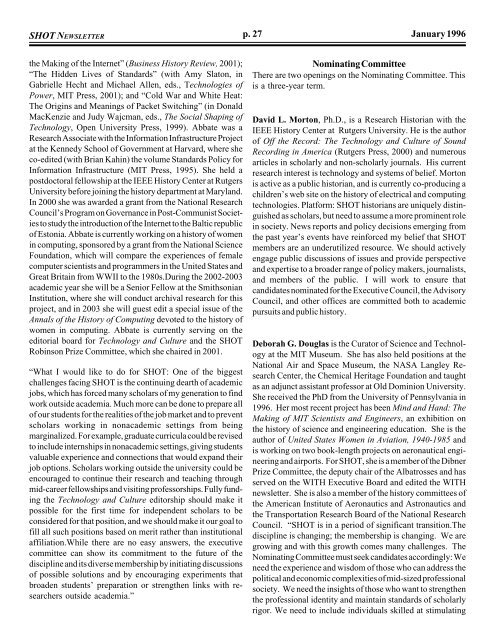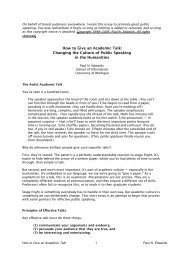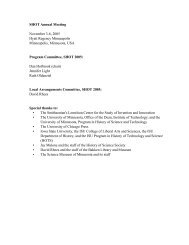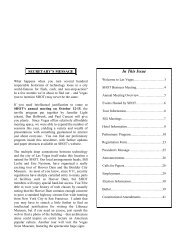NEWSLETTER - Society for the History of Technology
NEWSLETTER - Society for the History of Technology
NEWSLETTER - Society for the History of Technology
You also want an ePaper? Increase the reach of your titles
YUMPU automatically turns print PDFs into web optimized ePapers that Google loves.
SHOT <strong>NEWSLETTER</strong><br />
<strong>the</strong> Making <strong>of</strong> <strong>the</strong> Internet” (Business <strong>History</strong> Review, 2001);<br />
“The Hidden Lives <strong>of</strong> Standards” (with Amy Slaton, in<br />
Gabrielle Hecht and Michael Allen, eds., Technologies <strong>of</strong><br />
Power, MIT Press, 2001); and “Cold War and White Heat:<br />
The Origins and Meanings <strong>of</strong> Packet Switching” (in Donald<br />
MacKenzie and Judy Wajcman, eds., The Social Shaping <strong>of</strong><br />
<strong>Technology</strong>, Open University Press, 1999). Abbate was a<br />
Research Associate with <strong>the</strong> In<strong>for</strong>mation Infrastructure Project<br />
at <strong>the</strong> Kennedy School <strong>of</strong> Government at Harvard, where she<br />
co-edited (with Brian Kahin) <strong>the</strong> volume Standards Policy <strong>for</strong><br />
In<strong>for</strong>mation Infrastructure (MIT Press, 1995). She held a<br />
postdoctoral fellowship at <strong>the</strong> IEEE <strong>History</strong> Center at Rutgers<br />
University be<strong>for</strong>e joining <strong>the</strong> history department at Maryland.<br />
In 2000 she was awarded a grant from <strong>the</strong> National Research<br />
Council’s Program on Governance in Post-Communist Societies<br />
to study <strong>the</strong> introduction <strong>of</strong> <strong>the</strong> Internet to <strong>the</strong> Baltic republic<br />
<strong>of</strong> Estonia. Abbate is currently working on a history <strong>of</strong> women<br />
in computing, sponsored by a grant from <strong>the</strong> National Science<br />
Foundation, which will compare <strong>the</strong> experiences <strong>of</strong> female<br />
computer scientists and programmers in <strong>the</strong> United States and<br />
Great Britain from WWII to <strong>the</strong> 1980s.During <strong>the</strong> 2002-2003<br />
academic year she will be a Senior Fellow at <strong>the</strong> Smithsonian<br />
Institution, where she will conduct archival research <strong>for</strong> this<br />
project, and in 2003 she will guest edit a special issue <strong>of</strong> <strong>the</strong><br />
Annals <strong>of</strong> <strong>the</strong> <strong>History</strong> <strong>of</strong> Computing devoted to <strong>the</strong> history <strong>of</strong><br />
women in computing. Abbate is currently serving on <strong>the</strong><br />
editorial board <strong>for</strong> <strong>Technology</strong> and Culture and <strong>the</strong> SHOT<br />
Robinson Prize Committee, which she chaired in 2001.<br />
“What I would like to do <strong>for</strong> SHOT: One <strong>of</strong> <strong>the</strong> biggest<br />
challenges facing SHOT is <strong>the</strong> continuing dearth <strong>of</strong> academic<br />
jobs, which has <strong>for</strong>ced many scholars <strong>of</strong> my generation to find<br />
work outside academia. Much more can be done to prepare all<br />
<strong>of</strong> our students <strong>for</strong> <strong>the</strong> realities <strong>of</strong> <strong>the</strong> job market and to prevent<br />
scholars working in nonacademic settings from being<br />
marginalized. For example, graduate curricula could be revised<br />
to include internships in nonacademic settings, giving students<br />
valuable experience and connections that would expand <strong>the</strong>ir<br />
job options. Scholars working outside <strong>the</strong> university could be<br />
encouraged to continue <strong>the</strong>ir research and teaching through<br />
mid-career fellowships and visiting pr<strong>of</strong>essorships. Fully funding<br />
<strong>the</strong> <strong>Technology</strong> and Culture editorship should make it<br />
possible <strong>for</strong> <strong>the</strong> first time <strong>for</strong> independent scholars to be<br />
considered <strong>for</strong> that position, and we should make it our goal to<br />
fill all such positions based on merit ra<strong>the</strong>r than institutional<br />
affiliation.While <strong>the</strong>re are no easy answers, <strong>the</strong> executive<br />
committee can show its commitment to <strong>the</strong> future <strong>of</strong> <strong>the</strong><br />
discipline and its diverse membership by initiating discussions<br />
<strong>of</strong> possible solutions and by encouraging experiments that<br />
broaden students’ preparation or streng<strong>the</strong>n links with researchers<br />
outside academia.”<br />
p. 27<br />
January 1996<br />
Nominating Committee<br />
There are two openings on <strong>the</strong> Nominating Committee. This<br />
is a three-year term.<br />
David L. Morton, Ph.D., is a Research Historian with <strong>the</strong><br />
IEEE <strong>History</strong> Center at Rutgers University. He is <strong>the</strong> author<br />
<strong>of</strong> Off <strong>the</strong> Record: The <strong>Technology</strong> and Culture <strong>of</strong> Sound<br />
Recording in America (Rutgers Press, 2000) and numerous<br />
articles in scholarly and non-scholarly journals. His current<br />
research interest is technology and systems <strong>of</strong> belief. Morton<br />
is active as a public historian, and is currently co-producing a<br />
children’s web site on <strong>the</strong> history <strong>of</strong> electrical and computing<br />
technologies. Plat<strong>for</strong>m: SHOT historians are uniquely distinguished<br />
as scholars, but need to assume a more prominent role<br />
in society. News reports and policy decisions emerging from<br />
<strong>the</strong> past year’s events have rein<strong>for</strong>ced my belief that SHOT<br />
members are an underutilized resource. We should actively<br />
engage public discussions <strong>of</strong> issues and provide perspective<br />
and expertise to a broader range <strong>of</strong> policy makers, journalists,<br />
and members <strong>of</strong> <strong>the</strong> public. I will work to ensure that<br />
candidates nominated <strong>for</strong> <strong>the</strong> Executive Council, <strong>the</strong> Advisory<br />
Council, and o<strong>the</strong>r <strong>of</strong>fices are committed both to academic<br />
pursuits and public history.<br />
Deborah G. Douglas is <strong>the</strong> Curator <strong>of</strong> Science and <strong>Technology</strong><br />
at <strong>the</strong> MIT Museum. She has also held positions at <strong>the</strong><br />
National Air and Space Museum, <strong>the</strong> NASA Langley Research<br />
Center, <strong>the</strong> Chemical Heritage Foundation and taught<br />
as an adjunct assistant pr<strong>of</strong>essor at Old Dominion University.<br />
She received <strong>the</strong> PhD from <strong>the</strong> University <strong>of</strong> Pennsylvania in<br />
1996. Her most recent project has been Mind and Hand: The<br />
Making <strong>of</strong> MIT Scientists and Engineers, an exhibition on<br />
<strong>the</strong> history <strong>of</strong> science and engineering education. She is <strong>the</strong><br />
author <strong>of</strong> United States Women in Aviation, 1940-1985 and<br />
is working on two book-length projects on aeronautical engineering<br />
and airports. For SHOT, she is a member <strong>of</strong> <strong>the</strong> Dibner<br />
Prize Committee, <strong>the</strong> deputy chair <strong>of</strong> <strong>the</strong> Albatrosses and has<br />
served on <strong>the</strong> WITH Executive Board and edited <strong>the</strong> WITH<br />
newsletter. She is also a member <strong>of</strong> <strong>the</strong> history committees <strong>of</strong><br />
<strong>the</strong> American Institute <strong>of</strong> Aeronautics and Astronautics and<br />
<strong>the</strong> Transportation Research Board <strong>of</strong> <strong>the</strong> National Research<br />
Council. “SHOT is in a period <strong>of</strong> significant transition.The<br />
discipline is changing; <strong>the</strong> membership is changing. We are<br />
growing and with this growth comes many challenges. The<br />
Nominating Committee must seek candidates accordingly: We<br />
need <strong>the</strong> experience and wisdom <strong>of</strong> those who can address <strong>the</strong><br />
political and economic complexities <strong>of</strong> mid-sized pr<strong>of</strong>essional<br />
society. We need <strong>the</strong> insights <strong>of</strong> those who want to streng<strong>the</strong>n<br />
<strong>the</strong> pr<strong>of</strong>essional identity and maintain standards <strong>of</strong> scholarly<br />
rigor. We need to include individuals skilled at stimulating





